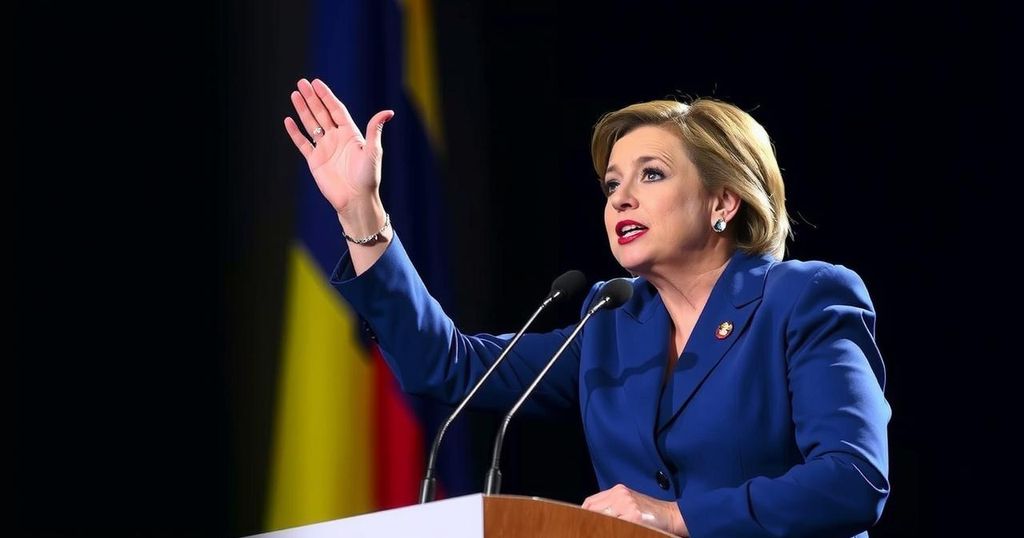Surprising Shift in Romanian Politics: Hard-Right Populist Leads Presidential Vote

Calin Georgescu, a hard-right populist, leads Romania’s presidential election with nearly 23% of votes counted, surpassing Prime Minister Marcel Ciolacu. This unexpected turn reflects public discontent amidst economic struggles and rising living costs. Georgescu’s platform includes criticism of NATO and EU policies, with a controversial stance on Romania’s historical figures. A run-off vote is set for December 8, 2023, which may have lasting implications for Romania’s foreign relations and political landscape.
In an unexpected turn of events, Calin Georgescu, a hard-right populist in Romania, has taken an early lead in the presidential race, orchestrating a surprising challenge to the country’s pro-European sentiment. With nearly 23% of the votes reported, Georgescu edged out Prime Minister Marcel Ciolacu, who holds approximately 20%. As the nation anticipates a run-off vote scheduled for December 8, this outcome emerges from widespread skepticism of mainstream candidates amidst concerns over the economy and rising living costs.
Calin Georgescu, a relatively obscure figure in Romanian politics who previously held roles in the Ministry of Environment, managed to gain traction primarily through social media outreach, particularly on platforms such as TikTok. Despite low polling numbers prior to the election, where he only commanded about 5% support, his campaign resonated with voters seeking an alternative to the current governmental approach and critiques of Romania’s alignment with NATO and EU policies.
Georgescu’s critiques extend to international issues, specifically criticizing Romania’s military assistance to Ukraine amid the ongoing conflict with Russia and the presence of NATO missile defenses on Romanian soil. He has historically called for a reassessment of Romania’s past leadership, controversially asserting that Ion Antonescu, allied with Hitler during World War II, should be viewed as a national hero. In his post-election remarks, he claimed, “the people have cried out for peace. And they shouted very loudly, extremely loudly.”
As a NATO and EU member that shares a significant border with Ukraine, Romania continues to grapple with its security policies and regional stability, which have led to various military aid initiatives for Ukraine amid ongoing threats from Russia. The presidential race outcome underscored the shifting sands of political affiliation and public sentiment in Romania, indicating a potential pivot away from its traditionally pro-Western stance.
The current political climate in Romania is indicative of a broader trend in European politics, where traditionally dominant centrist parties are facing challenges from populist movements. The emergence of candidates like Calin Georgescu signals a growing discontent among the electorate with the established order, particularly in relation to economic challenges and foreign policy dilemmas, including the ongoing war in Ukraine. Romania’s historical context, including its past leadership during World War II and its recent integrations into NATO and the EU, provides a complex backdrop for these political dynamics. As the country navigates its relationship with both Western alliances and regional security threats, the implications of the upcoming presidential run-off are significant for future governance.
In summary, Calin Georgescu’s unexpected rise in the presidential race marks a pivotal moment in Romanian politics, reflecting broader populist sentiments and challenges to established political norms. As he prepares to compete against Prime Minister Marcel Ciolacu in the forthcoming run-off, the implications of his platform—including a critical stance on NATO and EU affiliations—could reshape Romania’s foreign policy direction. This candidacy not only highlights voter discontent but also signals possible shifts in Eastern European political landscapes towards more radical ideologies as the region assesses its security needs amid ongoing geopolitical tensions.
Original Source: www.aljazeera.com






